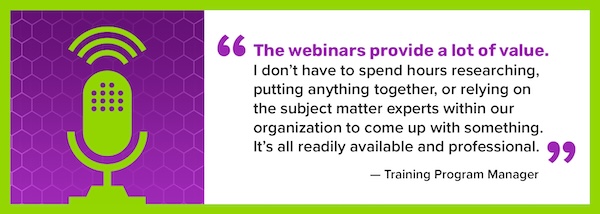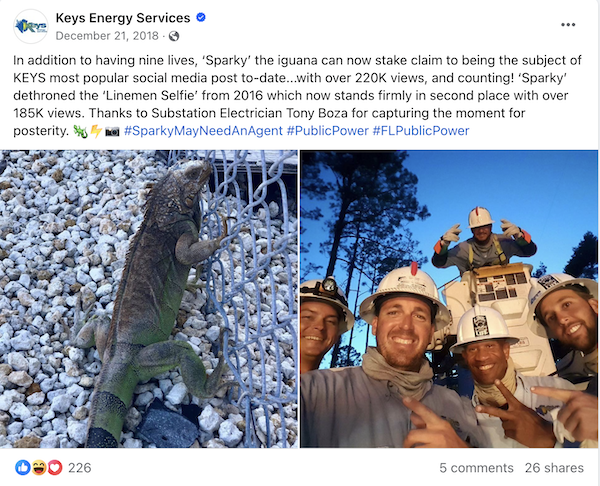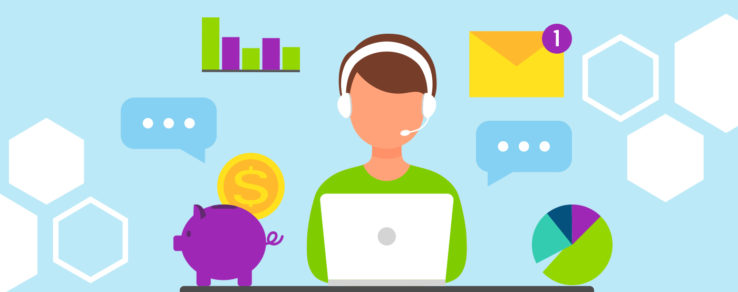So much to do, so little time.
Marketers in all industries face a constant struggle of managing a heavy workload with limited resources. In the utility space, working on billing updates, program promotions, marketing services and assisting with daily customer questions can feel like it takes an army to accomplish. In the public power sector, that army is typically made up of one person.
It’s no secret that municipal utilities typically have smaller marketing teams, while still trying to accomplish the tasks of large investor-owned utilities (IOUs). It’s a difficult space to maneuver in, but it’s not impossible. In fact, despite being small, these municipality marketing teams play a profound role in enhancing customer satisfaction, building community engagement, and driving overall success.
Regardless of team size, it’s imperative for municipal utilities to fine-tune their marketing strategies. A carefully planned and well-executed marketing initiative can dramatically boost customer engagement, enrich service offerings and make a substantial contribution to the utility’s bottom line. Small municipality marketing teams face many challenges, but there are ways to navigate these hurdles with a strategy that drives meaningful results.
The Challenges for Municipality Marketing Teams
Small marketing teams often grapple with several common challenges. The top two? Time and money.
Time is always at a premium, with countless tasks demanding attention. There’s never enough time in a day to accomplish everything on a to-do list, so priorities must be made.
Budget constraints can limit the scope of marketing initiatives, making it difficult to keep up with larger utilities that have more resources. With little or no budget, marketing initiatives can falter, missing the intended mark.
However, these challenges are not insurmountable. With the right approach, even a “team of one” can achieve impressive results.
Meeting Marketing Hurdles Head-On
Smaller municipality marketing teams don’t have the luxury of assigning tasks to various teammates or picking and choosing the projects they work on. Instead, they’re all-in on anything and everything. It can be difficult at times, but with the right strategy in place, smaller marketing teams can thrive.
Developing a marketing strategy
As a team of one, efficiency is of the upmost importance. To empower your municipality marketing team, it’s essential to first establish an effective strategy and clear goals. In doing so, the marketer will better be able to maximize both their time and energy.
When developing an effective marketing strategy:
- Establish clear goals: Understand what the team wants to achieve with your marketing efforts and what the utility’s overarching goals are. Whether it’s increasing customer engagement, promoting conservation or driving program participation, having clear objectives will guide your strategy.
- Understand your audience: Know who your customers are, what they want and how you can provide value to them. Use data-driven insights to create messages that resonate with your audience.
- Create quality content: Focus on creating content that is informative, engaging and provides value to your audience. This could be blog posts, infographics, webinars or social media updates.
- Leverage digital tools: There are numerous digital tools available that can streamline your marketing process. Tools like Canva for designing visuals, Hootsuite for managing social media, and Google Analytics for tracking website performance can make the team’s job much easier.
- Measure and adjust: Regularly measure your marketing efforts against your goals. Use the insights gained to adjust your strategy as needed.
Social media marketing
Social media is a powerful tool to use to your municipality marketing team’s advantage. Connecting with utility customers on Facebook, Instagram or X (formally Twitter) is an easy way to reach customers with important information and receive their feedback in real-time. Although not always positive, it’s important to allow your customers to express their feelings and respond accordingly when appropriate.
For a small team, however, the thought of managing multiple social media accounts can be daunting. It can be hard to find time to post on all the platforms, plus keep up with the constant changes in algorithms. There’s a learning curve to social media. Still, there are many tools to assist small teams in developing social media content.
- Scheduling tools: An easy way to have posts ready for the week is to schedule them in advance. Many platforms offer their own scheduling tools that teams can use directly. There are also paid tools like Sprout Social and Hootsuite that offer advanced scheduling and reporting capabilities.
- Design tools: Small teams typically don’t have in-house designers available for projects. Luckily, platforms like Canva and Adobe Express allow anyone to create images and graphics for social media. Both tools include ready-to-use templates in various social media sizes, and both have free or paid versions.
Agency partners, like Questline Digital, can even provide images and copy for social media that are available for anytime use. A simple “copy and paste” and you’re on your way to building social engagement.
Community engagement
A major way for municipality marketing teams to make an impact is through community engagement. A marketing team may be small, but that doesn’t mean it can’t lean on partners who can help. In fact, collaborating with community partners like the local government, schools or non-profit organizations is a surefire way to spread the message about your utility’s programs and services.
For example, in an interview with Rochester Public Utilities (RPU) in Minnesota, Patty Hanson, Manager of Utility Programs and Services, discussed how important community is to their organization. They have a multitude of community events throughout the year to connect with local organizations and share important information with customers about their electric and water programs and services.
“We have coming up our 21st Annual Arbor Day Celebration. That’s a huge community event. We engage the school district and do a poster contest through the school district, we invite students, third through fifth, and bring in live music,” says Hanson. “We have partnerships with nurseries, the Boys and Girls Club, Minnesota Energy Resources, all these different vendors.”
Sustainability and conservation are important topics within the Rochester community, as well as weatherization and energy efficiency. Connecting with different types of customers in the community about these topics is an important goal for RPU, including those who may be lower income or who speak different languages.
“We actually did a partnership with Minnesota Energy Resources [the local natural gas provider] where we did weatherization events at trailer parks and we handed out LED bulbs. We talked about how to read your bill and conservation measures that people can take,” says Hanson. “We also have our Neighborhood Energy Challenge where we provide free workshops and offer a discounted energy audit, only charging customers $50 or providing it free of charge for low-income customers. We sent out 867 multi-language postcards promoting the event to low-income customers receiving financial assistance. We have a very diverse, multicultural base in Rochester.”
By working with the local community and holding different events, RPU is able to effectively connect with customers. For all small municipality marketing teams, community involvement is an important tactic to reach as many customers as possible.
Small Marketing Team Success Stories
Success means different things to different people. When it comes to small teams versus large teams, success also takes on a different meaning. While there are many similar measures of success among IOUs and public power, there are some things a smaller team might want to additionally focus on.
What does success look like?
Measuring the success of a municipality marketing team’s initiatives can be different than measuring the success of a team of 10 or 20 from a large utility. Since one person can’t accomplish as much as a large team, it’s important to pick and choose what metrics of success to focus on.
For any sized team, measuring success in terms of key performance indicators (KPIs) is important. Some of these KPIs include:
- Open rate
- Click-through rate
- Follower growth
- Social media engagement
- Website traffic
- Event attendance
However, while the numbers from each of these metrics speak loudly, sometimes success needs to be measured more qualitatively than quantitatively. These metrics come down to the goals and expectations your team set at the beginning of an initiative.
Some qualitative metrics that are less tangible, but just as important to consider, include:
- Credibility: Are customers turning to your municipal utility for answers and resources?
- Awareness: Is your municipal utility becoming more recognized online or in the community?
- Customer education: Are your customers showing more interest and knowledge in the topics or programs you’re sharing with them?
- Customer feedback: Is your utility receiving positive feedback from its customers about the initiatives you’re working on?
These qualitative metrics are just as impactful as the analytics following an email deployment or social media post. It’s important to reflect on all aspects of success when it comes to a smaller team.
Small Marketing Team Success Stories
Remember, despite being small, you’re not alone. There are a vast number of resources available to assist with your municipality marketing team’s goals. For example, one Southeast utility’s marketing team wanted to increase training opportunities for its account managers. However, as a team of one, the utility didn’t have the resources or time to produce quality training materials.
Instead of stretching its bandwidth to a breaking point, the utility partnered with Questline Digital to produce and host monthly training webinars. Through live webinars and on-demand recordings, the utility was able to build up a robust library of training resources without exhausting its internal team.

Keys Energy Services shared its initiatives as a small team at the recent American Public Power Association Customer Connections Conference. Julio Torrado, the utility’s Director of HR and Communications, shared a multitude of examples of his work to connect and engage with customers.
The presentation’s focus was on humanizing your utility’s brand. Torrado shared examples of successful customer engagement tactics, including hosting a calendar drawing competition for schools, planning bucket truck rides for the community, sharing lineworker day-in-the-life photos on social media and more.
As Torrado shared these examples, he asked the following questions to the audience:
- Are your communications friendly? Approachable? Easy to understand?
- Are your outreach efforts as reliable as your power system?
- Are you visible on both sunny and cloudy days?
- Do you showcase a wide cross-section of employees from varied fields, or do you keep using the same faces?
- Are you the first place a customer turns for information?
Although Torrado has worked as a team of one, he reinforced connecting with outside partners to assist with various initiatives. Collaboration, whether within the organization or outside, is imperative to producing work that resonates with customers.

For example, Torrado has specific lineworkers he can call or text to ask for photos in the field. He also has strong relationships with local school districts to help promote calendar contests and other community events. By partnering with the community, Keys Energy Services saw some of the largest engagement with a Facebook post reaching over 220,000 views.
Small Team, Big Impact
Being a team of one in utility marketing doesn’t mean you can’t achieve big results. By building a clear strategy, leveraging data-driven insights, getting involved in the community and making use of digital tools, you can drive significant results even with a small municipality marketing team. Remember, it’s not about the size of your team but the impact of your efforts.

